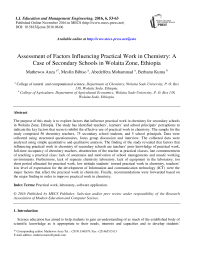Assessment of Factors Influencing Practical Work in Chemistry: A Case of Secondary Schools in Wolaita Zone, Ethiopia
Автор: Mathewos Anza, Mesfin Bibiso, Abedelfeta Mohammad, Berhanu Kuma
Журнал: International Journal of Education and Management Engineering(IJEME) @ijeme
Статья в выпуске: 6 vol.6, 2016 года.
Бесплатный доступ
The purpose of this study is to explore factors that influence practical work in chemistry for secondary schools in Wolaita Zone, Ethiopia. The study has identified teachers', learners' and school principals' perceptions to indicate the key factors that seem to inhibit the effective use of practical work in chemistry. The sample for the study comprised 56 chemistry teachers, 75 secondary school students, and 5 school principals. Data were collected using structured questionnaires, focus group discussion and interview. The collected data were analyzed using simple quantitative and qualitative analysis. The finding of the study revealed that factors that influencing practical work in chemistry of secondary schools are teachers' poor knowledge of practical work, full-time occupancy of chemistry teachers, absenteeism of the teacher at practical classes, late commencement of teaching a practical class; lack of awareness and motivation of school managements and unsafe working environments. Furthermore, lack of separate chemistry laboratory, lack of equipment in the laboratory, too short period allocated for practical work, low attitude students' toward practical work in chemistry, teachers' low level of expectation for the development of Information and communication technology (ICT) were the major factors that affect the practical work in chemistry. Finally, recommendations were forwarded based on the major finding in order to improve practical work in chemistry.
Practical work, laboratory, software application
Короткий адрес: https://sciup.org/15014041
IDR: 15014041
Список литературы Assessment of Factors Influencing Practical Work in Chemistry: A Case of Secondary Schools in Wolaita Zone, Ethiopia
- Millar R. The role of practical work in the teaching and learning of science. National Academy of Sciences, Washington, DC, 2000.
- Science Community Representing Education, SCORE. Practical work in science: a report and proposal for a strategic framework, London, 2007.
- Ministry of Education, MoE. The education and training policy and its implementation. Addis Ababa: Ministry of Education, Ethiopia, 2010.
- Wellington J. (Ed.). Practical Work in School Science. Which Way Now? London: 1998. Routledge.
- Science Community Representing Education, SCORE. Getting practical: a framework for practical science in schools. London: DCSF, 2009a.
- Science Community Representing Education, SCORE. Practical work in science: a report and proposal for a strategic framework London: DCSF, 2009b.
- Motlhabane A. The Voice of the Voiceless: Reflections on Science Practical Work in Rural Disadvantaged Schools. Mediterranean Journal of social Sciences, 4(14): 165-173, 2013.
- Bekalo SA and Welford AG. Secondary pre-service teacher education in Ethiopia: its impact on teachers' competence and confidence to teach practical work in science. International Journal of Science Education, 21, 1293-1310, 1999.
- Hodson D. Practical work as a scientific method: The decades of confusion and distortion. Journal of Curriculum Studies, 28(2), 115-135, 1996.
- Woodley E. Practical work in school science. Why is it important? SSR, 91(335), 49-51, 2009.
- Hofstein A. and Maalmlok-Naaman R. The laboratory in science education: the state of the art. Chemistry Education Research and Practice, 8(2), 105-107, 2007.
- Domin DS. A review of laboratory instruction styles. Journal of Chemical Education, 76(4): 543-547, 1999.
- Shiland TW. Constructivism: The Implications for Practical work. Journal of Chemical Education, 76(1), 107-108, 1999.
- Wiersma W. Research method in education an introduction (6 edn), London sage publication, 1999.
- Adedayo and Julius O. Analysis of factors influencing students' attitudes towards the practical aspect of secondary school physics in Ekiti state. International Journal of Multidisciplinary Research and Development, 2(7), 417-421, 2015.
- Wei LI, Ruijin ZHOU, Peiqi DENG, Qiang FANG, Pengwei ZHANG. Construction of Case Teaching Model for Management Specialty Supported by Information Technology. I.J. Education and Management Engineering, 2(9), 44-48, 2012.
- Science Community Representing Education, SCORE. Practical Work in Science: A Report and Proposal for a Strategic Framework. Gatsby Technical Education Projects, 2008.
- Motswiri MJ. Supporting chemistry teachers in implementing formative assessment of investigative practical work in Botswana. Thesis. University of Twente, Enschede, 2004.
- Soyibo SK. A critical review of some of the causes of students' poor performance in science. Journal of Science Teachers Association of Nigeria, 27thAnnual Conference: 80-87, 1986.
- Ajayi PO and Julius O. Evaluation of the implementation of senior secondary school physics practical activities in Nigeria. Research in Curriculum Studies, 5(1), 90-99, 2008.
- Krajcik JS. McNeill KL and Reiser BJ. Learning-goals-driven design model: Developing curriculum materials that align with national standards and incorporate project-based pedagogy. Science Education, 92(1), 1-32, 2007.
- Kozma RB and Russell JW. 4M: Chem-multimedia and mental models in chemistry. Journal of Chemical Education, 71(8), 669-670, 1994.


